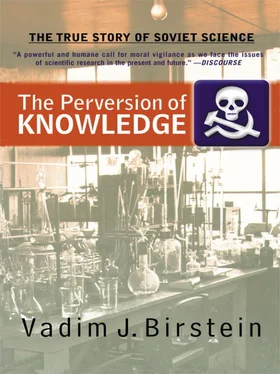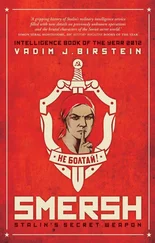Fitin, Pavel(1907–1971) joined the NKVD in 1938. Deputy head and then head of the Fifth Department (Foreign Intelligence) within the NKVD Main State Security Directorate (GUGB) (1938–1941), head of the First Directorate (Foreign Intelligence) in the NKGB/NKVD/NKGB (1941–1946), deputy MGB representative in Germany (1946–1947). From 1947, in charge of regional and republican MGB/MVD branches. On November 11, 1953, dismissed from the MVD (Petrov and Skorkin, Kto rukovodil NKVD , p. 423).
Frank, Gleb(1904–1976), biophysicist. Graduated from Crimean University (1925). At the Medical Faculty of Moscow University; published papers jointly with his professor Aleksandr Gurvich. At the Leningrad Physical-Technical Institute (1929–1933), head of the Biophysics Department at the All-Union Institute of Experimental Medicine (VIEM) (1933–1946), then at the Institute of Experimental Biology (under the directorship of Professor Gurvich). Head of the Academy Laboratory of Biophysics of Isotopes and Emission (in 1952, renamed the Institute of Biophysics) (1943–1952) and head of the Radiation Laboratory within the Medical Academy (1946–1948), which later became the Institute of Biophysics. Director of this institute (1948–1951). Director of the Academy Institute of Biophysics (1957–1976). Corresponding member of the Medical Academy (1945), of the USSR Academy (1960), academician (1966). In 1947, joined the Communist Party. Stalin Prize (1949 and 1951). Knew about Mairanovsky’s experiments and supported him.
Frinovsky, Mikhail(1898–1940) joined the VCheKa (Moscow) in 1919. Deputy head of the NKVD (1936–1937), head of the NKVD Main State Security Directorate (GUGB) (1937–1938). After the fall of Yezhov in April 1939, commissar for the navy. Arrested on March 6, 1939, and shot on February 4, 1940. Not rehabilitated (Petrov and Skorkin, Kto rukovodil NKVD , pp. 425–426).
Gertsovsky, Arkady(or Aaron) (1904–?) joined the VCheKa in 1920. Deputy head (1938–1940 and 1941–1943), and head (1941) of the NKVD First Special Department, head of the NKGB/MGB Department “A” (Archive) (1943–1953). Arrested in 1953 and in 1955 sentenced to 10 years’ imprisonment in labor camps (Kokurin and Petrov, Lubyanka , pp. 28–29, 107–110, 263, and Sudoplatov, A., Tainaya zhizn’ , vol. 2, p. 485).
Gorbunov, Nikolai(1892–1938), Party figure. Joined the Party in 1917. Graduated from Petrograd Technological Institute (1917). Secretary of the Council of People’s Commissars (Sovnarkom) and Lenin (1917–1919); also head of the Scientific-Technical Department of the Supreme Council of the National Economy (VSNKh) (1918–1919). Executive secretary of the Sovnarkom (1920–1929), head of the Department of Scientific Institutions of the Sovnarkom (1923–1929), and rector of the Moscow Higher Technical College (1923–1929). Member and vice president of the Agricultural Academy (VASKhNIL) (1929–1931), director of the Karpov Institute of Chemistry (1931–1933). Academician (1935), permanent secretary academician (1935–1938). Arrested on February 19, 1938. On September 7, 1938, condemned to death as a spy and shot. Rehabilitated in 1956.
Gorky, Maxim(1868–1936; pseudonym of Aleksei Peshkov; “gorky” means “bitter” in Russian), the only major Russian writer actively involved in the Social Democratic movement. Followed the Bolsheviks, but often at odds with Lenin. His involvement gave the Bolsheviks prestige and ability to raise money. Published a series of novels, plays, and poems, of which the play The Lower Depth (1902), staged by Konstantin Stanislavsky, became the most popular. In 1902, Tsar Nicholas II did not approve his election to the academy. Two writers, Anton Chekhov and Vladimir Korolenko, left the academy in protest. Lived abroad (1906–1913). Opposed the Bolshevik seizure of power in 1917. Attacked Lenin’s dictatorial methods in his newspaper New Life until July 1918. From 1919 onward, cooperated with Lenin’s government and helped writers and scientists. Emigrated, lived in a villa in Sorrento, Italy (1921–1928). Returned to the Soviet Union (1928) and became a prop of Stalinist political orthodoxy. In 1931, took part in the trip of a group of Soviet writers to the main construction projects conducted by prisoners of the NKVD labor camps. In 1934, together with the other 31 writers, published a book titled The White Sea–Baltic Stalin Canal (translated into English in 1935 under the title Belomor ), which glorified the NKVD and slave labor (see details in Aleksandr Solzhenit-syn’s The Gulag Archipelago , 1918–1956; vol. 3, pp. 81–102). President (1934–1936) of the Soviet Writers’ Union, which obliged writers to follow the literary method of Socialist Realism, i.e., to be political propagandists. Died in 1936 when he was under medical treatment for tuberculosis. In 1938, during the show trial of Nikolai Bukharin and others, three doctors were accused of killing Gorky. The former NKVD commissar Genrikh Yagoda “confessed” that he had ordered Gorky’s assassination.
Gorsky, Anatolii(1907–?) joined the OGPU in 1928. NKVD/NKGB deputy rezident and then rezident in London (1936–1944). Controlled Kim Philby and other English spies. Transferred to Washington (1944–1946). On October 24, 1945, met with former U.S. vice president and Secretary of Commerce Henry A. Wallace, who proposed to invite a group of Soviet physicists to witness American achievements in the atomic project. In the Committee of Information (1947–1952), then at the Second MGB Directorate (Andrew and Gordievsky, KGB , p. 293; Weinstein and Vassiliev, The Haunted Wood , pp. 283–285; Andrew and Mitrokhin, The Sword and the Shield , pp. 83–85, 90, 113, 124, 142–143; Trubnikov, V. I., ed., Ocherki istorii Rossiiskoi vneshnei razvedki [Essays on the History of the Russian Foreign Intelligence], vol. 4., 1941–1945 [Moscow: Mezhdunarodnye Otnosheniya, 1999], pp. 261–263 [in Russian]).
Govorov, Leonid(1885–1941), botanist. Head of the Section of Leguminous Plants in the All-Union Plant Breeding Institute (VIR) and professor of genetics at Leningrad University. Created a worldwide collection of leguminous plants in the VIR. Arrested on February 15, 1941, and on July 9, 1941, sentenced to death. Shot on July 27, 1941. Rehabilitated in 1956.
Grashchenkov, Nikolai(1901–1965), neurologist. Joined the Bolshevik Party in 1918. Graduated from Moscow University (1926). At the Medical Faculty of Moscow University (later Moscow First Medical Institute) (1926–1933) and at the All-Union Institute of Experimental Medicine (VIEM). Deputy commissar of health (1937–1939), director of the VIEM (1939–1944). During World War II (1941–1945), consultant to the Red Army on problems of neuropathology and neurosurgery. Director of the Neurological Institute within the Medical Academy (1944–1948). Professor at the Central Institute of Final Medical Education in Moscow (1951). Corresponding member (1939), member of the Medical Academy (1944), member of the Belorussian Academy of Sciences (1947). President of the Belorussian Academy (replaced the geneticist Anton Zhebrak) (1948–1951). Supported Mairanovsky.
Gurvich, Aleksandr(1874–1954), cytologist, author of the theory of mitogenetic radiation of dividing cells. Graduated from the Medical Faculty of Munich University (Germany) (1897). At Bern University (Switzerland) (1901–1905). Chair of the Anatomy and Histology Department at the Bestuzhev Courses in St. Petersburg (1907–1914); in the army (1914–1918). At Simferopol University in the Crimea (1919–1924), chair of the Histology and Embryology Department of the Medical Faculty at Moscow University (1924–1929), head of the Laboratory (then Department) of Experimental Biology at the Institute of Experimental Medicine (IEM, then VIEM) in Leningrad (1930–1945), director of the Institute of Experimental Biology (Leningrad) within the Medical Academy (1945–1948). Retired in 1948 after Lysenko’s triumph; continued to work at home. In 1949 was accused of being the mythical Jewish Masonic Lodge’s “Grand Master.” Stalin Prize (1940).
Читать дальше











